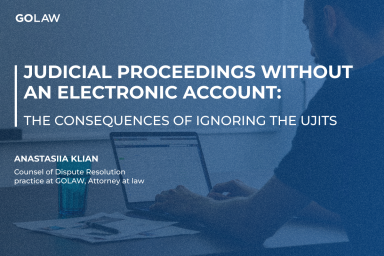Credit Resource
Challenges banks may encounter in projects on joint crediting with international financial institutions
Ukrainian banks are increasingly resorting to joint financing of large borrowers.
Such large-scale projects are often implemented with the involvement of funds of international financial institutions (IFI), such as the International Finance Corporation and the European Bank for Reconstruction and Development.
The major feature of such crediting is that it is performed based on the international standards and documents subject to the law of other jurisdictions, as the national legislation lags far behind the international practice and fails to properly regulate relationships between creditors.
In most cases, an IFI acts as a senior creditor in joint financing and has priority rights as regards debt security and repayment. When concluding deals with IFIs, banks should take into account not only the advantages of such transactions, but also their possible risks.
Security for Obligations
The security for obligations to the creditors is one of the most important issues of joint financing; it is implemented by way of pledging debtor’s assets, including their real estate and corporate rights.
Regulation of legal relationships between creditors with respect to security is mainly performed with the use of English law and on the basis of various agreements, in particular the Subordination Agreement, the Intercreditor Agreement, the Security Sharing Agreement, etc.
The purpose of such agreements is to establish the rules for the interaction between creditors, to determine the priority of creditors’ claims, the order of foreclosure, as well as the disposition of funds obtained from debt repayment and the sale of the subject of pledge.
At the same time, since a Ukrainian company acts as the debtor in such deals, banks should take into account the difficulties of implementing such agreements under the current Ukrainian legislation.
“Red Flags” in Agreements
For example, the possibility to conclude the Subordination Agreement defining the order of debt repayment between creditors is not properly regulated by the Ukrainian legislation, and this mechanism is, in fact, implemented only by amending each specific agreement in part of the schedule of payments.
In the bankruptcy procedure, the Subordination Agreement will not be taken into account either by the court, or by the liquidator, since the order of satisfaction of claims established by the law cannot be changed by mutual agreement between creditors.
When concluding a Security Sharing Agreement / Intercreditor Agreement, creditors determine the priority (order) of claims for security assets and the procedure for the disposition of funds obtained from the debtor. At the same time, the legislation allows for establishing the priority of the security and mortgage only based on the order of encumbrance registration.
It is important for Ukrainian banks to understand that with the foreclosure on mortgaged property, the subsequent mortgage (second priority) will be terminated. In practice, there arise a large number of questions related to the disposition of recovered assets among creditors.
Also, in the event of debtor’s bankruptcy, it is not improbable that the satisfaction the secured creditors’ claims will be carried out in proportion to their declared requirements, regardless of the priority of claims set by any agreement, as such creditors will be assigned to one and the same order.
It is worth noting that both the Intercreditor Agreement and the Security Sharing Agreement do not meet the criteria for eligibility of security. Therefore, when determining the credit risks norms, a bank will not be able to take into account the second priority security, which may also have a negative impact on the rating of this bank.
Finally, when entering into deals with IFIs, it is necessary to keep in mind their special status, in particular, the inviolability of archives, which, in fact, makes it impossible to request any information from the IFIs, as well as the immunity of assets from confiscation or arrest.
Of course, large financing projects are an excellent opportunity for a bank to add some respectable customers to its loan portfolio. However, a whole range of conditions for such deals may lead to unpleasant consequences that need to be predicted and removed in a timely manner.

Dr. Valentyn Gvozdiy
Managing Partner, Attorney at law, PhD
- Contacts
- 31/33 Kniaziv Ostrozkykh St, Zorianyi Business Center, Kyiv, Ukraine, 01010
- v.gvozdiy@golaw.ua
- +38 044 581 1220
- Recognitions
- ITR World Tax 2025
- LEXOLOGY INDEX 2025
- The Legal 500 EMEA 2023
- Who’s Who Legal 2022
Sign up to be aware
New achievements are inspired by information. GO further, don’t miss out GOLAW news and legal alerts
Our expertise
-
- Antitrust and Competition
- Banking and Finance
- Compliance, Corporate Governance and Risk Management
- Corporate and M&A
- Criminal and White Collar Defence
- Defense in Anti-corruption procedures and regulations
- Labor and Employment
- Natural Resources and Environment
- Government Relations (GR)
- Insolvency and Corporate Recovery
- Intellectual property
- International trade
- Legal support of business and private Сlients in Germany
- Litigation and dispute resolution
- Private clients
- Real Estate and Construction
- Energy and Natural Resources
- Restructuring, Claims and Recoveries
- Martial Law
- Tax and Customs
-
- Agribusiness
- Aviation
- Chemical industry
- Engineering, Construction and Building Materials
- Natural Resources and Environment
- Financial institutions
- IT and AI
- Industry and manufacturing
- Healthcare industries, Life sciences and Pharmaceuticals
- Media, Entertainment, Sports and Gambling
- Retail, FMCG and E-Commerce
- Transport and Logistics
We use cookies to improve performance of our website and your user experience.
Cookies policy
Cookies settings







